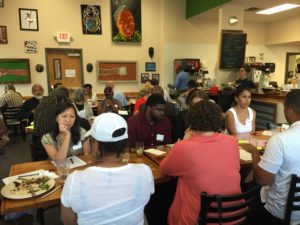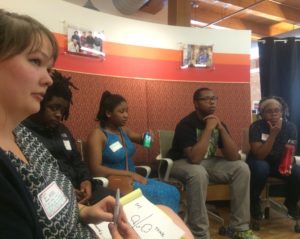“Change Happens at the Speed of Trust”

Editor’s Note: This piece was originally published on the Jay & Rose Phillips Family Foundation of Minnesota blog.
It’s not entirely clear to me who coined that phrase. A Google search was inconclusive, although Stephen Covey wrote a book entitled “The Speed of Trust” in 2006, so maybe he gets credit. Regardless, this phrase became the centerpiece of the Foundation’s work in 2016 to overhaul our funding priorities and refocus our grantmaking in North Minneapolis. It served as a critical lesson that had to be learned and relearned throughout the process.
When our trustees directed us in late 2015 to reimagine our grantmaking to be bolder, more focused, and to achieve greater impact, staff knew we were being challenged to think differently about our work. But when they further identified North Minneapolis as the primary geography of our future grantmaking, a whole new level of complexity was added to the challenge.
Why?
As we reflected on the trustees’ directive and explored ways to move the Foundation in this new direction, our limitations as an institution and the neighborhood’s complex history with philanthropy became clear. None of us lived in North Minneapolis, so we had little genuine insight into the aspirations and assets of Northsiders. As an all-white staff and board who enjoy certain economic advantages, we lacked understanding of the real-life lived experience of communities of color who make up the majority of Northsiders. Further, philanthropy’s history of top-down transactional relationships, broken promises and frequent ineffectiveness has engendered distrust among Northside leaders, nonprofits and residents.
Developing funding strategies without gaining a deeper understanding of these challenges would have resulted in something that resembled more of the same. There would have been very little community buy-in, the Foundation’s motives would have been questioned, and funds would have likely flowed through the same channels and to the same organizations as in the past. Little would be different and our desire to be BOLDER would in fact have been met with distrust and uneasiness.
 We knew we had to change the dynamic. We began by changing how we show up as individuals and as an institution. The Human Centered Design (HCD) process we used to gain a deeper understanding starts with empathy building – “a deep focus on the target beneficiary to truly understand his or her explicit and implicit needs.” (Nadia Roumani, Stanford Social Innovation Review). To that end, we spent time meeting with and listening to parents, students, teachers, school leaders, small business owners, citizens, leaders, and more. The goal here was to listen with new ears – to get past our own experience, and strive to hear the lived experiences of those impacted by issues the Foundation cares about. Active listening was the key activity. Only through active listening and authentic engagement could we begin to build trust.
We knew we had to change the dynamic. We began by changing how we show up as individuals and as an institution. The Human Centered Design (HCD) process we used to gain a deeper understanding starts with empathy building – “a deep focus on the target beneficiary to truly understand his or her explicit and implicit needs.” (Nadia Roumani, Stanford Social Innovation Review). To that end, we spent time meeting with and listening to parents, students, teachers, school leaders, small business owners, citizens, leaders, and more. The goal here was to listen with new ears – to get past our own experience, and strive to hear the lived experiences of those impacted by issues the Foundation cares about. Active listening was the key activity. Only through active listening and authentic engagement could we begin to build trust.
Foundations historically spend more time talking to and about marginalized communities than listening to them. We frequently set strategy without real community input, usually behind closed doors away from community view. We tend to use proxies to speak for the targeted beneficiaries of our funding, or defer to content experts who study data and conduct research. This dynamic has led many to distrust the motives and wisdom behind philanthropic efforts, while simultaneously shape shifting themselves to fit their work into a foundation’s funding priorities.
It’s a recipe for ineffectiveness.
So we centered our strategy development on trust-based listening. But trust, we came to learn, is a fragile commodity. It is not earned once and granted forever. It must be nurtured and re-earned constantly. Trust is earned by showing up time and again, and staying engaged even when the conversation gets difficult and your very presence is called into question. Trust is earned when you’re transparent with your intentions and do not hide in your processes or in “philantro-splaining.” Trust is earned when you move into uncomfortable and unfamiliar space and stay there, taking your lumps and allowing yourself to feel the experience.
For us as staff, trust was key at so many points within our process. When we engaged in conversations with individuals, did they trust that we would take what they shared seriously? When folks  shared their prototype ideas for possible solutions, did they trust we wouldn’t steal their ideas and implement them ourselves? Did the community believe that this wasn’t a one-time effort and that we were truly in it for the long haul? Could we build trust across rather stark racial differences? Could I trust myself to truly change in the face of new understandings and not resort back to old and counterproductive behaviors? Did the ongoing approval of our trustees to move forward in the process translate into trust that the process was producing the results they were looking for?
shared their prototype ideas for possible solutions, did they trust we wouldn’t steal their ideas and implement them ourselves? Did the community believe that this wasn’t a one-time effort and that we were truly in it for the long haul? Could we build trust across rather stark racial differences? Could I trust myself to truly change in the face of new understandings and not resort back to old and counterproductive behaviors? Did the ongoing approval of our trustees to move forward in the process translate into trust that the process was producing the results they were looking for?
Here’s an example to illustrate the complexity and necessity of trust.
The Foundation engaged 17 people to serve on two grant review committees. These folks were primarily people of color and Northside residents. After reviewing 42 proposals, they recommended 21 for further consideration and site visits, and eventually recommended 13 for funding. These recommendations went to our board of trustees for final approval. We were clear throughout the process that our trustees had final approval and that no recommendation was guaranteed funding.
When our trustees reviewed the recommendations, they had a lot of questions about what these recommended proposals were ultimately trying to do. They asked whether these proposals achieved the “bolder” mandate they gave us. They wondered whether any of these ideas would lead to the kind of “big idea” that could result in transformative change. As a result, they chose to fund only 6 of the recommended proposals and asked staff to deepen their exploration on a couple of additional ideas revealed in the proposals. We got there through some honest conversations with our trustees that helped all of us better understand that trust and dialogue are key components to change.
 This news could have been devastating to the trust built over the previous 10 months. But as a staff we had very honest conversations with our community reviewers, the organizations that had submitted the recommended proposals and other community members. We didn’t run away with our tail between our legs. While there was widespread disappointment in the outcome, folks greeted our transparency as an opportunity to stay engaged and keep the Foundation accountable to its commitment to North Minneapolis.
This news could have been devastating to the trust built over the previous 10 months. But as a staff we had very honest conversations with our community reviewers, the organizations that had submitted the recommended proposals and other community members. We didn’t run away with our tail between our legs. While there was widespread disappointment in the outcome, folks greeted our transparency as an opportunity to stay engaged and keep the Foundation accountable to its commitment to North Minneapolis.
Setbacks happen. You can weather those setbacks if you’ve taken the time to build trust and deepen relationships through authentic listening and engagement. Not everyone trusts us but that doesn’t diminish our interests or intentions. Remember, change happens at the speed of trust. No quicker. No slower.
Stay tuned. Over the next year, we’ll be announcing some pretty good stuff in which we’re partnering with North Minneapolis. And maybe you too could get involved with us!
